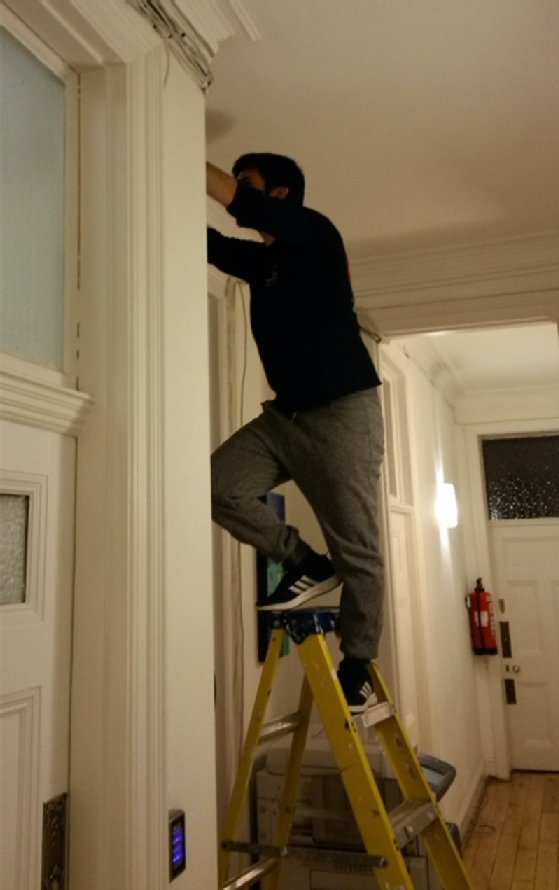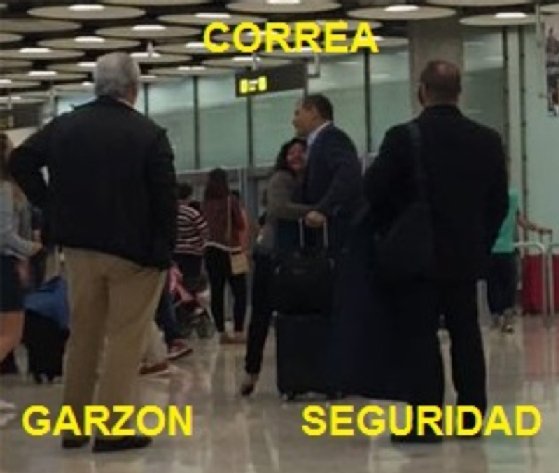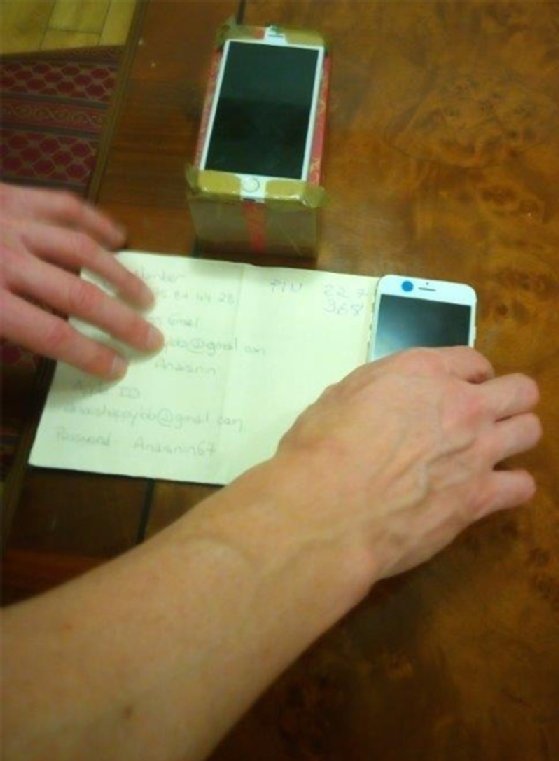
Getty Images
Former UC Global staff confirm Embassy surveillance operation against Julian Assange
Spanish court investigates claims that security company illegally recorded meetings between Julian Assange, politicians, lawyers and celebrities at the Ecuadorian Embassy in London
The Spanish National Court, Audiencia Nacional, this week heard testimony from four former employees of a company that provided security services to the Ecuadorian Embassy in London when it offered sanctuary to WikiLeaks founder Julian Assange.
The court in Madrid is investigating whether Undercover Global SL and its owner, David Morales Guillén, secretly recorded meetings between Assange and his visitors during the seven years he spent in the Ecuadorian Embassy.
One of the victims of the operation is the former president of Ecuador, Rafael Correa. Court documents show that UC Global staff secretly photographed Correa at a meeting at Spain’s Adolfo Suárez-Barajas Airport. Correa claims the mobile phones of his family were hacked.
Also at issue is whether UC Global breached the privacy rights of journalists, politicians, diplomats, doctors and celebrities who visited Assange during his stay at the Embassy.
Aitor Martínez Jiménez, a member of Assange’s Spanish legal team, said the four UC Global staff had confirmed email evidence already presented to the court that detailed the surveillance operation.
“They have confirmed what we had said, that the cameras recorded audios, that they kept the hard drives with the recordings, that when there were sensitive visits, they were asked for the recordings,” said Martínez Jiménez. “And they took the documentation of the people who visited Assange.”
UC Global’s spying operation came to light in April 2019 when the Spanish newspaper El País revealed that the security company that monitored Assange until 2017 had installed surveillance cameras equipped with microphones and compiled reports on hundreds of people who visited Assange during his exile.
UC Global, registered as Undercover Global SL, was set up in 2008 and offered unregulated training courses in private security, private security services, first aid and rescue. The company was 100% owned by Morales until it was dissolved in June this year.
According to court documents, the company won a contract from the Ecuadorian intelligence service, Senain, to provide security services to the Ecuadorian Embassy in Knightsbridge, London.
Assange and his lawyers filed a criminal complaint against Morales to the Spanish court on 29 July 2019 based on witness statements supplied by former employees of UC Global. The witnesses gave anonymous evidence before a notary, arguing that they could be placed in danger should their names be revealed.
Police subsequently raided the home of UC Global’s founder and owner, Morales, in Jerez de la Frontera in south-west Spain on 19 September last year. They seized firearms, cash and mobile phones. They also seized copies of paperwork, laptops, hard drives, memory sticks, Post-it notes containing passwords, and mobile phones from UC Global’s offices in the same town.
Judge José de la Mata, head of court number 5 of the Spanish National Court, took a statement from the man accused of espionage, a former member of the Spanish military, Morales, and all the victims and witnesses located in Spain in February 2012.
Morales claimed the recordings of Assange had been made at the request of the former Ecuadorian ambassador in London, Carlos Abad, now deceased, who was removed from his post in November 2018 by Ecuadorian president Lenin Moreno, according to a report in El Pais.
He said he had been hired by Senain, Ecuador’s secret service, during the Correa government. As evidence, he presented an email from the former ambassador, dated 27 January 2018, in which he asked him to install a microphone in the Embassy meeting room.
Assange’s conversations with lawyer recorded
On Monday 27 July, Assange’s lawyer, Baltasar Garzón, Assange’s partner, Stella Morris, and the ex-consul of Ecuador, Fidel Narváez, testified before the National Court.
After the hearing, Garzón said his conversations with Assange at the Embassy had been secretly recorded.
“I have been shown some images from the recording video surveillance listening devices in which we, the lawyers, appear talking to Julian – something scandalous that could only be said to actually happen in spy movies,” he said.
“But this is not a spy movie because the life of a person who is a journalist is at stake. All that has been done is in persecution of a journalist, editor of WikiLeaks, for revealing very serious facts of crimes against humanity, of corruption.”

Ex-Ecuadorian consul Narváez said that at no time had the Ecuadorian Embassy given permission to UC Global to install cameras with audio capability to record all the meetings held by Assange. “They never informed us to record with audio,” said the diplomat.
Morris, who had two children with Assange while he was in the Embassy, affirmed that one of the technicians of the company alerted her that he had been ordered to steal the diaper of a baby that Stephen Hoo, actor and a friend of the cyber activist, regularly brought to the Embassy. UC Global intended to analyse the baby’s faeces to discover whether he was Assange’s son.
Correa’s family phones hacked
A report by UC Global, seen by Computer Weekly, reveals that UC Global photographed Correa and Garzon in the company of a security guard in the arrivals area of Adolfo Suárez-Barajas Airport on 24 September 2017.

The UC Global agents followed Correa and Garzon at they took a car to Garzon’s home in the wealthy Pozuelo de Alarcón area of Madrid.
Correa took a shower, before talking privately with Garzon, while the security guard talked to Garzon’s wife.
The report presents a photograph of Garzon shaking hands with Correa in 2011 as evidence that the two men were friendly before Assange.
David Morales later emailed a copy of the report to UC Global staff asking them to file it and mark it as confidential.
Another report, dated 17 November 2016, includes records and photographs of meetings held by Correa in Brussels.
It includes technical details of Correa’s Asus ZenBook laptop and iPad, including its serial number and IMEI number, a unique number associated with mobile devices.
A complaint filed in the Spanish court alleges that UC Global supplied his daughters with mobile phones containing spy software.
This allowed the company to access their chats, emails, telephone conversations and images, the complaint alleges, including intimate family photographs.
Fausto Jarrin, Correa’s legal adviser, said the judge of the Spanish National Court proposed separating the events related to Assange and Correa in separate investigations, given the seriousness of the allegations.
Jarrin said that his own his emails were posted on a hacking website in mid-May. He said he had not been able to report the matter to the Ecuadorian Prosecutor until this week, because of the coronavirus pandemic.
Ten further witnesses to give evidence
The judge has also agreed to take a statement from 10 more people as witnesses or victims through the criminal assistance system with third countries.
The new statements, which could begin in August, include attorneys Jennifer Robinson, Gareth Peirce and Renata Ávila, and Assange’s friend Pamela Anderson. "They even took the password from her phone," says Martínez Jiménez.
The Greek economist and politician Yanis Varoufakis will also be called to testify as a victim of surveillance.
But the most anticipated statements of those agreed by the judge are those of Zohar Lahav, chief of security for Las Vegas Sands Corp, and former US Congressman Dana Rohrabacher.
UC Global signed a contract with Las Vegas Sands, the casino and leisure company owned by Sheldon Adelson, to provide security for Adelson’s ship the Queen Miri in 2015.
Former employees of UC Global alleged that Morales may have use Las Vegas Sands as a conduit to the CIA to deliver material on Assange. The court is investigating the claims and has yet to reach a conclusion.
"The workers have affirmed in court that the material was sent to the intelligence [services] of the United States," said Martínez Jiménez.
"In the case there are multiple emails where objectives were indicated, training was requested, access to the FTP server that the company had was requested."
"These emails were sent from the IP [address] of the main Las Vegas Sands hotel. Instructions were also sent from that hotel in perfect English that had been provided to David Morales to open a second user of the cameras, expressly requesting that the user from Ecuador be unaware."
"There are emails from David Morales openly talking about the provision of the material to the Americano, American client ’or‘ friends of the USA ’among many other evidences that are still in the investigation phase and which have not yet been accessed,” he said.
The Spanish lawyer said that the judge agreed to take a statement from Lahav, after reviewing email evidence that showed Morales had sent instructions in English from the US which were traced to an IP address at one of Las Vegas Sands' hotels. The emails explained how to access camera feeds without the knowledge of Ecuador.
Assange’s legal team has asked the court to seek a statement from Brian Nagel, a former high-ranking officer of the US secret service who became head of Las Vegas Sands Corp’s global security.
“We understand that he may be the liaison with the [US] intelligence services, but the judge has said, for now, no,” said Martínez Jiménez. The judge has also declined to order a statement from Adelson.
Presidential pardon
Rohrabacher visited Assange in the Embassy in 2017, claiming to offer him a presidential pardon on behalf of Donald Trump.
The quid pro quo was that Assange would publicly say that the source of the published emails from Hillary Clinton and the Democratic National Committee was not Russia, according to Martínez Jiménez.
He said that at the time of Rohrabacher’s visit, the US had not yet filed formal charges against Assange.
“After Assange refused, he was charged with 18 charges under the Espionage Law – it can be understood as extortion,” said the lawyer.
Jennifer Robinson, one of Assange’s lawyers who was present at the meeting recounted the incident in a witness statement.
When it became public during one of Assange’s extradition court hearings in the UK, the Whitehouse dismissed the incident as a ‘complete fabrication’
Rohrabacher said in a statement that he was acting in his own capacity. “At no time did I talk to President Trump about Julian Assange. Likewise, I was not directed by Trump or anyone else connected with him to meet with Julian Assange.”
“However, when speaking with Julian Assange, I told him that if he could provide me information and evidence about who actually gave him the DNC emails, I would then call on President Trump to pardon him.”
Assange: ‘I was a victim of surveillance’
Assange testified before judge De la Mata by video conference, following protracted negotiations with the UK, in December 2019.
“It was finally found and confirmed that he was a victim, that he had no idea that there were hidden microphones, that the cameras were recording audio, that there are hours of recording of Julian’s meetings,” said Martínez Jiménez.
The court also heard evidence that UC Global staff had photographed visitors’ phones to record their International Mobile Equipment Identity (IMEI) codes.

“Assange was always suspicious of the company and always stated that he had his misgivings and even openly told me on occasions that these people were spying on him,” added Martínez Jiménez.
“In the most sensitive moments, I asked to have the meetings in the ladies’ room at the back and turned on the water. I told him that it was exaggerated, but as witnesses have stated, they had also placed a microphone in that ladies’ room.”
German journalists who had paid visits to Assange at the Embassy have also filed a complaint as victims of the espionage carried out by Morales’ company, the lawyer said.
Assange’s legal team believe that other victims of the surveillance campaign will file new complaints that will gradually be incorporated into the court’s investigation.
Spanish investigation will affect Assange’s extradition
Garzón said the investigation by the Spanish National Court would have a direct impact on the US extradition proceedings against Assange in London.
Assange, who was arrested on 11 April 2019, is being held at Belmarsh high security prison in south London, awaiting the British legal hearing, scheduled for September, on the US request to extradite him.
Garzón said taking Assange to the US represented an attack on freedom of expression and freedom of access to information, and would be a violation of defence processes.
The WikiLeaks founder faces 17 charges under the 1917 Espionage Act after WikiLeaks published a series of leaks from Chelsea Manning, a former US Army soldier turned whistleblower, in 2010-11.







